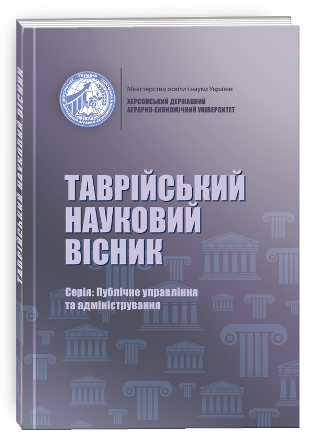THE ESSENCE OF THE FUNCTIONING OF CIVIL SOCIETY UNDER THE CONDITIONS OF MARITAL STATE
DOI:
https://doi.org/10.32782/tnv-pub.2023.5.9Keywords:
civil society, state policy, system, state administration, government, public organizations, interactionAbstract
The article examines the essence of the functioning of civil society in modern conditions of martial law, proves the relevance of the mentioned topic and substantiates its purpose. On the basis of existing research, the theoretical basis of building a modern civil society has been clarified. It is noted that a clear definition of the specified category has not yet appeared in the modern scientific space, based on this, the author's definition of the specified term is proposed and three components are selected from the proposed interpretation, with the help of which an attempt is made to prove the result of the functioning of civil society. In connection with this, the work states that the formation of Ukrainian civil society is characterized by a transformation under the influence of reformist or revolutionary forces, examples of which are the “Orange Revolution” and “Revolution of Dignity”, and the apogee of the transformation was the military aggression of the Russian Federation, which leads to the formation of a new civil society. what is happening now An analysis of the number of civic and charitable organizations is presented, the increase in which number indicates the presence of transformational transformations in the state. The article states that the result of the functioning of a democratic civil society can be the sustainable socio-economic development of the state, the criteria for evaluating which can be the quality and standard of living of the state's population. The assessment of the quality of life includes the indicators of civil society, in connection with this, examples of methods of assessment of the quality of life are given. The work claims that the effective socio-economic development of the welfare state depends on the relationship between civil society and the state. Under the conditions of the state choosing a democratic course of development, the state power promotes the influence of the majority on state policy. The presence of an effective civil society is one of the basic postulates of a democratic state, without it the existence of such a state is impossible.
References
Eva Bellin Civil society in formation: Tunisia URL: https://www.brandeis.edu/politics/people/faculty/pdfs/bellin-civil-society-in-formation.pdf
Формування та становлення громадянського суспільства в Україні: монографія. авт.кол.: В.І. Цимбалюк, В.І. Гришко, І.В. Міщук та ін. Одеса: КУПРІЄНКО СВ, 2019 158 с.
Головаха Є. Українське суспільство: шляхи трансформації. Український соціологічний журнал. 2016. № 1–2. С. 26–30.
Звіт за результатами дослідження «Громадянське суспільство України в умовах війни» URL: https://ednannia.ua/189-doslidzhennia/12456-gromadyanskesuspilstvo-ukrajini-v-umovakh-vijni-2022-zvit-za-rezultatami-doslidzhennya-3
Вимірювання якості життя в Україні, Аналітична доповідь, Лібанова Е.М., Гладун О.М., Лісогор Л.С. та ін. К.: 2013. 48 c.
Ільїна М.В. Соціально-економічна роль некомерційних організацій у забезпеченні сталого розвитку суспільства. Механізм регулювання економіки. 2011. № 3. С. 28–37.
Чотиривимірний простір суспільного блага URL: https://spilno.org/article/chotyryvymirnyi-prostir-suspilnoho-blaha
Економічний енциклопедичний словник : у 2-х т. Т. 2 / За ред. С.В. Мочерного. Львів : Світ, 2006. 568 с.
Бабарикіна Н.А. Громадянське суспільство як засіб гармонізації відносин між державою і громадянами. Грані. Політологія. 2014. № 11. С. 71–76.







